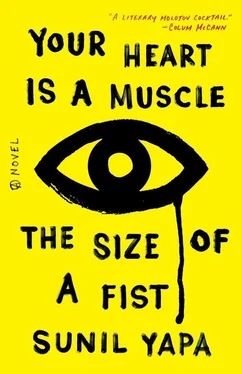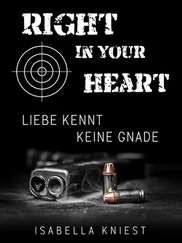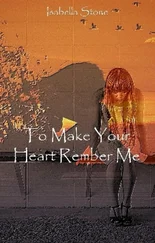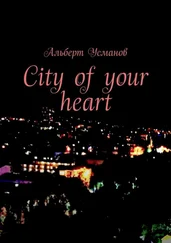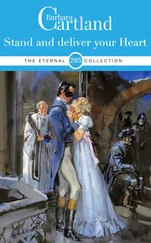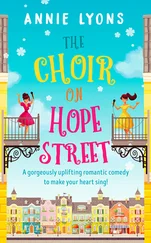The world and all its impossible wanting.
The bank window was a mirror and in the mirror she saw the green eyes of a coward. She hefted the weight of the crowbar. The green eyes of a girl who did not deserve anything but the burning to which the world had condemned her.
Arrest her? Let them arrest her. Prison was where she belonged.
NONVIOLENCE
NONVIOLENCE
NONVIOLENCE
They were chanting like an army of robots. The window in front of her beckoned. Something that looked like her face standing there watching her. She began swinging the head, getting the weight going. She heard wind pushing paper down the street, the rough whisper of the crowbar swinging in her callused hands. From far off, she heard voices, but they were distant decaying whispers as though she were at the bottom of a well.
The shot and the way he blindly reached, arm pointing and falling back. The airy bubbles of blood that sent his last breaths into the world.
The bar paused at the top of the arc.
In the mirror of the window she saw her own reflected face staring back at her.
When she was thirteen she had watched the Brixton riots on TV. She didn’t know what it was at the time but her mother’s boyfriend, who had hooked up an illegal cable box, didn’t go to work for a week, and they sat on the couch, drinking beers forbidden by her mother, and watched London burn. Sat on the couch next to each other while the hot summer sun baked the yard where tires collapsed and gathered rain, but it was cool and dark in the trailer and they were drinking beers and the beers so cold. Fresh from the fridge where he pulled and cracked and wiped a lip of white foam and grinned.
So cold her teeth hurt in that good kind of way.
All those people so angry and he didn’t have an answer for what made them that way, just said, “The cops shot someone’s mom,” and then drank and grinned and she didn’t need to ask because it was written into his face and his body and the way he moved through this stupid trailer and this stupid town, she would burn it down, too.
Sitting on the couch watching people burn and loot and smash, the gasoline vapors of whatever thing she was had found their image in the world and she moved from the couch to the floor, this thirteen-year-old girl in front of the TV with her cutoffs and her long white legs curled beneath her like earrings of silver or steel. She felt the heat baking her face and the gasoline wetting her hair and she looked into their faces and the thing that was inside her cried out in recognition. Half-drunk on the floor and her mother’s boyfriend doing something in his jeans behind her and calling her name.
A faraway shouting, a rhythmic chanting, a siren singing somewhere up there in the daylight above the well.
She brought the crowbar down, swinging hard. It crashed into the window with a rolling, sickly, solid boom. Her reflected chest split with spiderwebs. She raised it again, swinging, and let it fall, driving it into the window with all her force. She felt the solid weight, the crush of tempered metal on glass, as the clawhead leapt into the window. She took two steps back. There was nothing in her mind save the window and the bar and her wish to utterly annihilate that fractured beautiful green-eyed fool looking back at her.
No thoughts in her mind, just a cold mechanical rage. The window imploded. Glass laminate raining across the potted plants, the wooden desks, the smooth stone floor.
There was a gaping hole in the window, a ragged crater at the center of her chest. The line of people who were protecting the bank window moved back in alarm.
A wailing started on the far corner. A human wailing.
In some part of her heart she wished it were a cop. But it was not.
She turned to see a young girl kneeling on the corner, maybe sixteen or seventeen, blood running down her face. She was crying.
“Please come help us,” she said. “The cops are going crazy. They’re beating a man in the street.”
King was beside her and did not want to be.
The girl was crying and having a hard time just making sentences. And King, what did she care? She knew she needed to leave. The girl was on her knees in the street. At the foot of a traffic light saying, “We didn’t do anything. And they just went crazy. Please. Please come help us. We need more people. We didn’t do anything.” And then she was crying again and King couldn’t understand what she was saying because the girl was sobbing in her arms and King was holding her and waiting for her brain to tell her feet to move. They weren’t going to just start moving on their own.
Move, she told them.
The black-hooded monks headed for another target and King standing stupidly in the street, holding the bleeding girl, while she stood waiting for her brain or her feet or her heart to make a move while the cops came a-marching and the explosions rocked over their heads and a girl sobbed beneath a traffic light, which was going from red to green to yellow and back to red again and somewhere a siren like birds singing over the sea.
Officer Tim Park lived in a one-bedroom studio in Ballard where he slept on a futon that turned into a bed, or was it a bed that turned into a futon, he didn’t know and it didn’t matter because he rarely slept, and when he did, barely managed to shed his uniform before falling heavy to a sleeping bag, exhaustion being the price for the relief of dreamless sleep.
Most nights he drank and then crashed, the TV throwing light across his face, and the futon, and the near-empty apartment where the only thing he had hung on the wall was a set of photos he’d brought with him from Oklahoma in heavy frames and glass. They showed the Alfred P. Murrah Federal Building in black and white.
Before and after.
He didn’t like the photos; they bothered him, the face of the building blown half open, insides gaping. You could look right into the blasted interior. The contents of offices — charred desks, overturned chairs, phones still connected — just hanging in empty space like something torn out by the roots. Shredded and burnt office paper drifting like confetti.
He had been there that day, of course, one of the first responders, but still those photos looked to him like something utterly foreign. Something he could not relate to, even though he had been there, like pictures he’d seen on the news of places like Venezuela or the Philippines when an entire hillside gave way and the people and their cooking stoves and their dogs and their TVs and their kids went sliding into the mud-slicked abyss. More than anything the photos reminded him of the moon, and he often stood there alone, home after a shift, the lights off, stood there alone just looking; 168 people died in that blast, more than 600 injured, stood there alone in the darkness with a beer in his hand and his shirt unbuttoned. And if his hand went to the scar, if his fingertips softly traced the smooth flesh, idled along the density of that patch of wealed skin where no hair grew, did he notice? Did he notice his own hand touching his face as he contemplated his photos in total bewilderment?
He wanted to know: How did they allow that to happen? And every day since. How did they allow that to happen?
Not here. Because here he was taking care of that. On top of the PeaceKeeper tracking the crowd over the barrel of his shotgun loaded with rubber bullet shells and laying the violent ones down.
The crowd was furious. Objects, small objects, were flying over his head, ball bearings and golf balls and water bottles. He was standing on top of the ’Keeper and Ju was keeping them back with the baton, but they were at his feet, screaming. A plastic bottle bounced off his helmet and how the fuck were they going to get out of here?
Читать дальше
